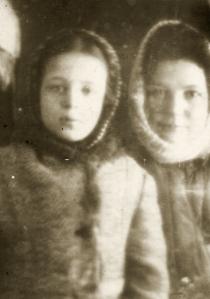Revekka Blumberg with her mother Hana-Leya Levin
This is my mother Hana-Leya Levin and I in exile, the village of Torphorazrabotki in Biysk region. This photo was taken in 1944.
I don't remember how my parents felt about the annexation of Lithuania to the Soviet Union. My father's business was nationalized, and our life became notably more difficult. I remember the day of deportation on 16th June 1941 very well. On this day many Lithuanian families were deported from their country, and their only fault was that they reached certain well-being through hard work and managed to provide for a decent life of their families. The deportation lasted for three days: from 14 to 16 June.
I remember very well how this was with my family despite my being just a child. Two NKVD officers came to our home and gave us half hour to get ready. Nobody knew what was happening. They allowed only the minimum of things, just one set of underwear and everything else and later in exile this had its impact. Those, who had more belongings with them, could bargain them for food products or milk for their children, while we didn't even have enough of what was necessary, to say nothing of excesses.
The trip was horrific. Children and adults were crying. This was really a nightmare. There was no food or drinking water available. When the train stopped, those women, who had extra clothes, could bargain them for food. There was no toilet in the train, and its passengers were using buckets that were stinking. There were little windows below the roof, but they were not allowed to be opened. It was so stuffy in the carriage that people were fainting. A few babies died on the way.
Finally we reached Biysk, from where we were taken to a settlement on a peat field. We were accommodated in wooden barracks with two- and three-tier plank beds. Most of us spoke Lithuanian and German and hardly any Russian. Women were sent to work in the peat fields almost immediately. One of them stayed in the barrack to look after the children.
Gradually all exiled were accommodated in local houses. There were only women, children and old people left in the settlement. Men were at the front. The family of our hosts consisted of Natasha, the hostess, her son of nearly my age and an old woman. Natasha was kind to us. Natasha treated me no different from her son. She read fairy tales to us in the evening and we shared whatever little food was available. Sometimes we received some balanda [soup], which was also rarely available.
I went to the local school for three years. During the Soviet times school had a strong political background. Soviet education was a very important aspect. We were convinced that the Soviet Union was the country of happy childhood, and that we owed this to Stalin, the father of all people, who was taking continuous care of us. We were set to very strong patriotic feelings.
In general, there were common children's joys in my exiled childhood. We spent time together and went to bathe in the Biya River. I was an active girl. I attended a dance club at school. My childhood, even the way I it was with me, was the best time of my life.
My mother and I were very poor. Mama, actually, was very lonely and very unpractical. Some women have a strong will and can find a way out of any difficult situation, but not my mother. She was a weak person and needed support and care of a strong man. She wanted to forget whatever had to do with our past life and never talked to people about it.



















